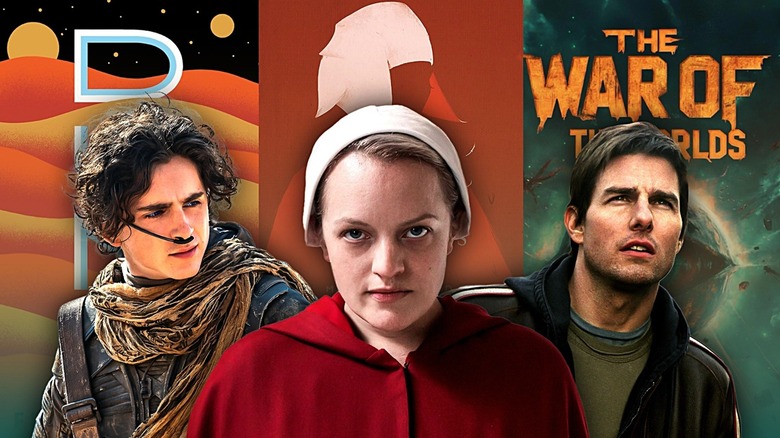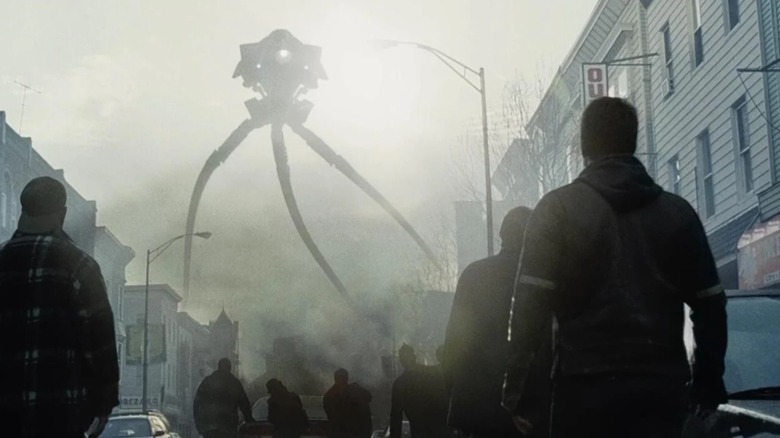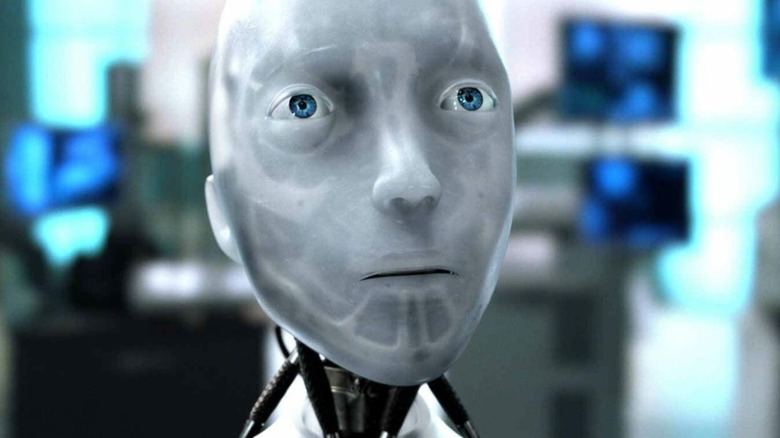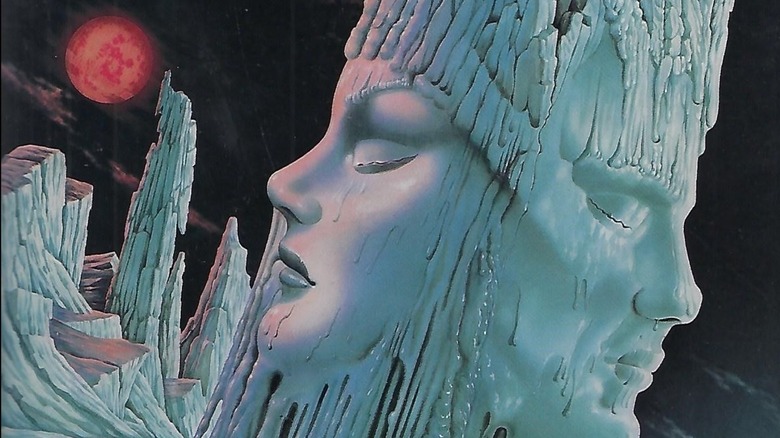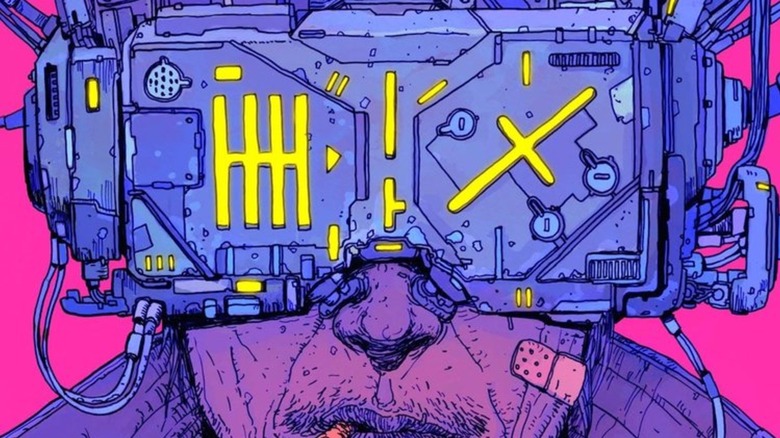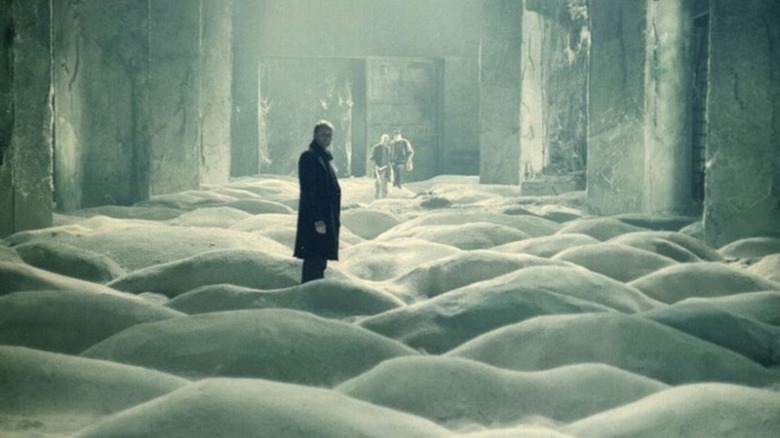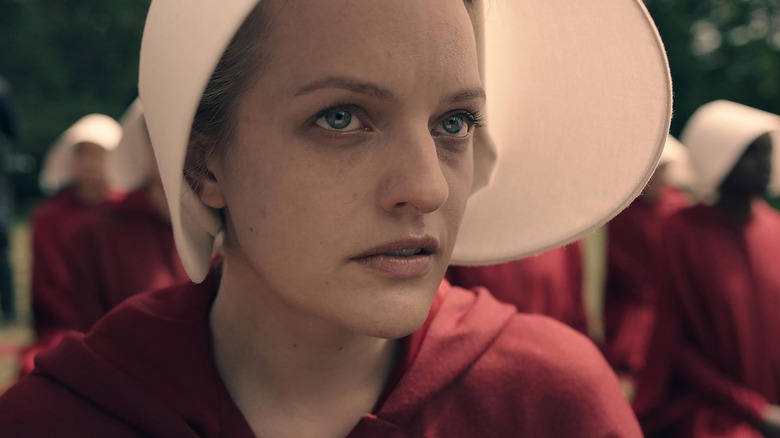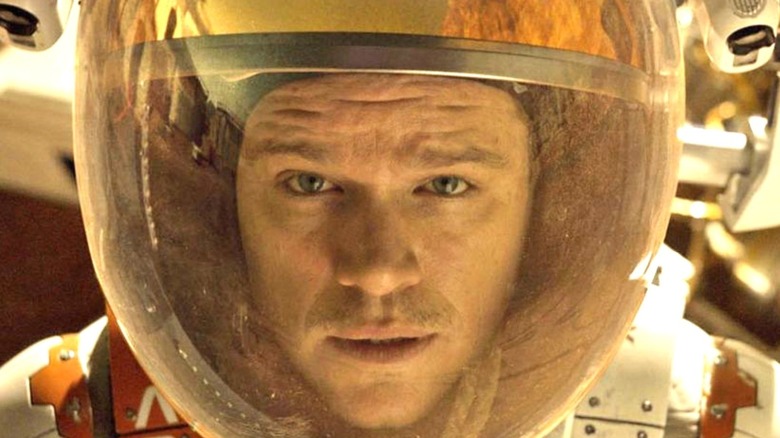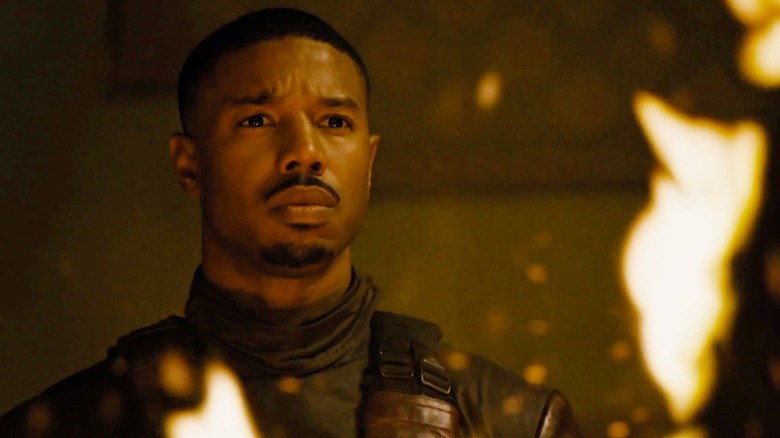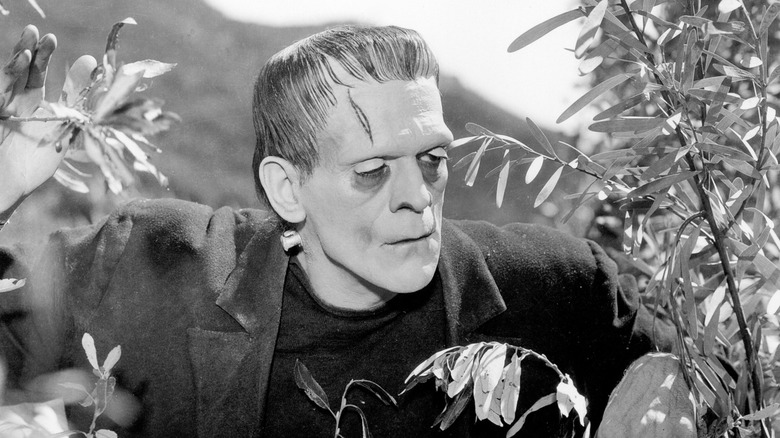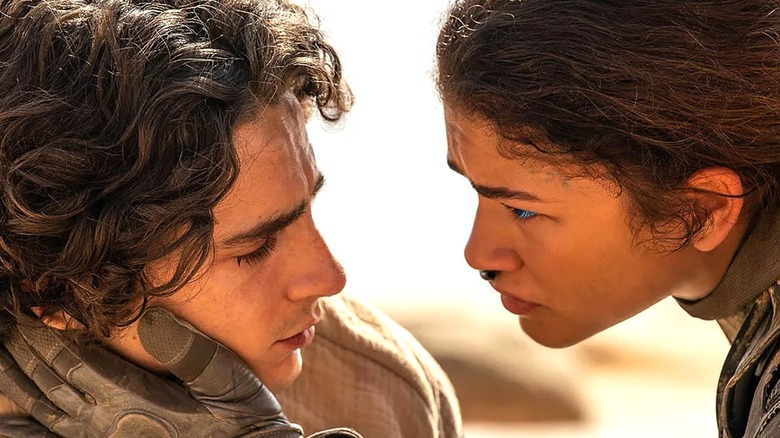10 Best Sci-Fi Books Of All Time, Ranked
Art carries with it a reflection of the world. The media we make, whether the times are turbulent or peaceful, shows us who we are, or were, or what could be, and it's almost always political. Science fiction is even more political by nature, as it draws from big ideas about technology and its applications, or arguments about gender and individuality, or how we treat an alien people we barely understand. These concepts are derided by misinformed individuals as 'woke,' as if cultural and social awareness is some disease, but these individuals also like to act as if 'woke' is some recent phenomena.
Unfortunately, this behavior is generational, as some of science fiction's greatest minds often had to obscure their identity as they were – gasp! — female, such as James Tiptree Jr. (Alice Sheldon) or C.J. Cherryh, or numerous people of color, like the Hugo-winning Samuel R. Delany. The wealth of diversity that shapes science fiction has existed since its genesis.
Science fiction is often treated as predictive as well, with "Star Trek" inventing communicators that span space, H.G. Wells suggesting airplanes and atomic bombs, and the harrowing "1984" positing a world of authoritarian erasure. Even James Cameron guessed at GPS and drone warfare. Yet in all these cases, those predictions are either canny guesses at how the technology that already exists will evolve, or are pulled together by threads of history that we desperately still need to learn from.
There's no better time to revisit history through the lens of science fiction than now, and these are the 10 best sci-fi books of all time that offer up a good place to start.
10. The War of the Worlds, H.G. Wells
Science fiction with apocalyptic invasion themes have an irresistible draw. Just dig up any interview with Orson Welles about the impact of his radio adaptation of "The War of the Worlds," and rediscover the wide-eyed terror quite a few Americans felt tuning into the middle of the show and thinking an alien invasion was actually happening. Though their feelings turned quickly to relief, the sensation can be replicated and intensified by asking someone where they were on 9/11. The parallel we're making is intentional, and Steven Spielberg's 2005 version (pictured above) pulls no punches in getting that point across. The horror of innocents turned into dust in the blink of an eye was all too familiar just four years after the terror attack on New York City. The fear and rage — often propagandized — at 'The Invader' remains the story's biggest point. Tom Cruise's countless near deaths throughout the movie don't detract from that theme.
That inherent terror of alien invasion is a starting point for a lot more than militant nightmares, though, and "War of the Worlds" can't help but prod curiously at its failing incursion force. There's a touch of sympathy for the dying aliens mixed into the triumph of survival, and "War of the Worlds" becomes the origin point for not only invasion stories but the exploration of surprise arrivals in general. The line from the Tripods to the Newcomers of "Alien Nation" or the prawns of "District 9" is a straight one, exploring what happens when the 'war' between worlds leaves us with terrible power over our new neighbors. Racism and genocide happens. Wells intended a critique of English Imperialism. He succeeded well enough to teach us all how to revisit this horror within ourselves.
9. I, Robot, Isaac Asimov
"I, Robot" is a themed collection of short stories, all of which explore robotics from technological and sociological viewpoints. It's the genesis of the Three Laws of Robotics, which would go on to shape not just decades of science fiction — "2001" ensures HAL 9000 attempts to adhere to the Laws, and Bishop (Lance Henriksen) from "Aliens" actively quotes it — but our real life ethics around robots and the still-nascent territory of AI.
The Laws are simple. First, a robot cannot harm, nor through its inaction, allow a human to be harmed. Second, a robot must obey all commands given by a human unless it conflicts with the first law. And third, a robot may protect itself, except when this conflicts with the prior two laws.
These laws leave a lot of wiggle room, and the stories allow for some creative adaptation. The Alex Proyas film, "I, Robot" (seen above) is mostly built off of the title the Three Laws, with a few details from the stories themselves and the charms of Will Smith and Alan Tudyk. Nonetheless, to understand the modern fascination with AI and our affection for genre marvels like "Astro Bot" and Lieutenant Commander Data, you begin with Asimov.
To learn how to subvert Asimov's laws, well, Asimov himself knew that the Laws would only work to keep balance with robots within the confines of human rationality. With irrational sorts behind the wheel for several of today's versions of 'AI,' and with drones and robot dogs gradually claiming the battlefield despite James Cameron's warnings of how a machine might warp its idea of the laws, it's chilling to remember that how our eventual robot overlords treat us is going to depend heavily on how we treated them. It's not looking good, is it?
8. The Left Hand of Darkness, Ursula K. LeGuin
There are reams of gender critique around "The Left Hand of Darkness," all of which add interesting viewpoints on how to interpret the book's reliance on creating an ambi-gender world in order to explore our own ideas about love. The criticisms, which suggest the book's original printing with male-dominant pronouns muddy the intent into something closer to male heteronormativity, are valid. Yet it's also valid to take the book on LeGuin's intentions, which were to set aside the differences of gender in order to offer potential harmony, instead.
The plot puts some "Game of Thrones"-style heavy political machining in a world where our human ambassador doesn't know all the rules. At first, he doesn't even understand that he has a steadfast ally in Estraven, a former prime minister, nor how Estraven actually feels about him. It's the learning that's most important, the time taken to listen and learn to one another, to treat differences as things to learn about, not hurdles. It's a compassionate story, if a little more flawed today, and still one of the finest examples of creating a world of the 'other' in order to look inside ourselves. It was a landmark of feminist science fiction, first printed in 1969 and still capable of making red pill twerps gag at the sheer notion that masculinity isn't always the answer to all social ills.
7. Neuromancer, William Gibson
When "Neuromancer" was written, television sets were chunky cathode ray emitters that worked on sorcery. The color of a dead channel, as Gibson describes the sky in the novel's first line, was a chaotic skitter of dirty snow. Today, a dead channel is often an empty charcoal grey. The world has changed. The sky is still unnerving, and William Gibson still wrote the keystone of modern cyberpunk. The Matrix, as Gibson envisioned, isn't yet the Wachowski Sisters' ruined world of hostile robots. It's a strange, geometric cyberscape; the networks of computer systems as visual metaphor. And there's already a nascent AI hiding in it, ready to get us to ask the hard questions about the survival of our identity and consciousness when submerged into the crashing sea of digital information.
Today, we understand implicitly what it means for a hacker to jack into cyberspace and go about our information-stealing business. We've done it ourselves playing "Cyberpunk 2077." We watched Neo (Keanu Reeves) transcend it in "The Matrix" trilogy. We saw Major Motoko Kusanagi use it to blend with a machine consciousness in "Ghost in the Shell." It all begins with down-on-his-luck console cowboy Case and a for-hire gig that'll either kill him or see the entire fledgling cyberworld undergo a revolution.
6. Roadside Picnic, Arkady and Boris Strugatsky
There are two great science fiction stories that put humans in proximity to inexplicable alien works that may cause apocalyptic changes to our species. One is the finest sci-fi movie of all time, the classic "2001: A Space Odyssey." The other, "Roadside Picnic," is the better novel. It does have a loose film adaptation, with a script penned by the Strugatskys. "Stalker," the outstanding, contemplative film by Andrei Tarkovsky, even provides the name for the "S.T.A.L.K.E.R." game franchise, which puts the film, the book, and the Chernobyl disaster (which happened 14 years after the publication of "Roadside Picnic") into a blender.
It's the final section of the book that's iconic, the hunt for a magical gift translated into a chance at natural evolution in "Stalker." By this time, our protagonist stalker, Redrick, has decades of experience scouring sites for alien picnic trash; artifacts left behind that cause impossible effects. This time, his client is seeking a golden orb that may change the world with the right wish. Redrick, however, wants something better for his child, born mutated because of the zone's increasing effects, and he's willing to sacrifice his client to win it.
Whether Redrick succeeds is moot. What's being explored is our humanity when faced with the utter incomprehensibility of the universe. "Roadside Picnic" applies the right layer of eldritch horror to a genre associated with logical science, along the way firing shots at opportunistic weapons manufacturers and the cavalier way humanity treats its environment. The latter forms the core of "Stalker," leaving behind the more alien aspects of the story in favor of contrasting the ruins of the zone with what we've done to each other.
5. The Handmaid's Tale, Margaret Atwood
"The Handmaid's Tale" spends most of its time laying pages of barely veiled subtext about how not only can this happen here but how to identify the men that want it to happen, what the first steps into the world of Gilead will look like, and how, with a trace of hope, to survive and resist this future. The bleakest horror of the novel is knowing that Atwood easily drew from history to create something your gut wants to reject as pure fiction.
Among her notes are historical anecdotes like this: In 1967, Romanian despot Nicolae Ceausescu criminalized abortion and contraception via Decree 770 in order to create a richer population. The Decree insisted that all women bear four (later five) children and enforced it via secret police. Many of these children would die. But unlike Florida, Ceausescu allowed abortion for cases of rape and incest. Atwood also kept a 1986 newspaper clip carrying the quote, "The super-patriotic, hyper-capitalists running America these days are deciding that we must do 'it' more often . . . We're not breeding fast enough to keep ahead of the dirty commies and dusky third-worlders." Elon Musk repeated this sentiment as recently as November 2024.
"The Handmaid's Tale" is not a fun read, and at six seasons, the Hulu miniseries only amplifies the pain, as Elizabeth Moss' Offred (seen above) takes on the additional horrors of being revamped into a hero in an uncomfortable vision of the world. You may even be tired of hearing about this story. Imagine how tired the women in your life are, waking up every damn day to discover what else New Gilead is trying to enact now. Do us a favor: Read the book, and help us re-fictionalize it.
4. The Martian, Andy Weir
Not every major science fiction novel is a downer. Andy Weir popped onto the scene with "The Martian," a book loaded with scientific detail, yet carried by a peppy blockbuster vibe so enthusiastic that it quickly became an equally peppy blockbuster film starring Matt Damon. It's a book that'll tell you more than you ever wanted to know about how to grow a potato, but hey, Mark Watney isn't exactly having the time of his life doing it. Even if he does get to become our first space pirate.
"The Martian" is the best kind of pro-NASA propaganda, reminding us that some of the brightest minds trying to get us thriving among the stars are some of the biggest dorks on Earth, and they deserve our love and support. They're the ideal of humanity: looking for ways to learn and evolve like our biggest sci-fi heroes but with the real life tools we have at hand. If you don't like MCU-style quippiness, you're probably not going to like Weir's writing style. You might not like the movie, either. With Sean Bean in place as NASA's flight director for the best "Lord of The Rings" gag a dork could hope for, the film amps the globe-trotting optimism and a 'we're all in this together' defiance into something that's a genuine comfort.
It's a tenor that permeates Weir's sillier follow-up "Project Hail Mary," whose adaptation will see our himbo movie king Ryan Gosling embody himbo science king Ryland Grace in another role he was born for. We deserve optimism in our science fiction, and we need reasons to keep fighting for a better future. Andy Weir is a master of showing us why: because we keep looking out for each other, even when it's hard as hell.
3. Fahrenheit 451, Ray Bradbury
"Fahrenheit 451" isn't just an anti-censorship screed. It's also a warning against media propaganda, and against the ascent of technology meant to pull our minds away from the thoughtful introspection books can provide. As the books burn, Bradbury predicts ear buds filling people's minds with junk meant solely to entertain and distract, spreading illiteracy and disinterest. Not at all familiar, right?
But the books are censored, and they do burn, in "Fahrenheit 451;" as Nazis burned books they considered dissident and harmful, as apartheid South Africa burned books throughout the '70s, including copies of Bradbury's novel, as even today books are banned and sometimes burned via right wing theocratic organizations disguised as concerned mothers. It was a pleasure to burn, certain oligarchs might quote, as they erase government websites and block crucial public safety data, all while stealing financial and personal information. It was a pleasure to block unedited footage of a rich man offering a Nazi salute at a presidential inauguration. Fascists know that free thought and critical analysis is a threat to any authoritarian regime. Bradbury understood this. Read "Fahrenheit 451" and relearn why.
You can skip the 2018 adaptation (pictured above) unless you're a big fan of both Michael B. Jordan and Michael Shannon. Their performances are good, but the finale is insulting, reducing the role of the human mind and the need for us to remember our history to a plot device injected by somebody that once read a neat anecdote in a pop science journal about junk DNA.
2. Frankenstein, Mary Shelley
Lady Gaga will always be our Mother Monster, but for science fiction historians, Mary Shelley bore that title first. Gothic horror wraps a veil around "Frankenstein," barely obscuring its place as the first blockbuster science fiction novel. The gift of free will, despite the intentions of its creator, fuels the Creature, while Victor Frankenstein's actions go to the nature of the soul. All of it goes towards questions of the responsibility of the Creator, both mortal and divine.
"Frankenstein" is far deeper than its movie monster counterparts, as fun as they all are. In the novel, there are no screams to a storming sky, or green skinned grunting mutes throwing children into ponds, despite how iconic Boris Karloff is as one of our original movie monsters in 1931”'s "Frankenstein." There isn't even a stirring performance of "Putting on the Ritz," which remains one of Mel Brooks' finest cinema moments (though it almost got cut). Instead the Creature, that modern Prometheus of stolen life, is articulate and determined, haunting his creator from the moment he's awakened.
Raw meat is forged into something beautiful, but the act of forcing life into this golem has given it the hideousness implied in the act of stealing God's life-giving fire. And all it wants is a chance to love, to live as a human, even knowing how the world sees him. Victor flees from what he's made, but can never really escape. Dr. Herbert West still salivates at Frankenstein's success, even as Lovecraft's mad doctor continually misses the points made.
1. Dune, Frank Herbert
"Dune" isn't merely a landmark of space opera. It's a galaxy-spanning, history-sprawling, all-encompassing treatise on the evolution of humanity and the mutation of human control. It's the textbook on how to make the intricate politics of back-stabbing trade federations into something relevant and interesting. "Dune" is an early diatribe about the blood for oil nature of world-controlling powers, taking aim at OPEC, the organization still controlling petroleum exports today. Masked as CHOAM, a monolithic entity controlling all trade and using the Spacing Guild as its silent diplomat, they're as much an enemy to Arrakis as the Padishah Emperor. But "Dune" doesn't stop with its overt financial politics or with its relatively nuanced application of Islamic faith.
Gender politics is another partner, as feminine power finds unusual weight in the Bene Gesserit and the women of Arrakis. It's a theme that gets weirder and frankly falls astray as the later books in the saga try to weave power and sexuality together into a comedy about how good the constantly reborn Duncan Idaho is in the sack, yet the attempt is intriguing, making the Bene Gesserit one of the most fascinating organizations in fiction.
Feminine power is the foreground of Denis Villeneuve's adaptation, focusing sharply on the machinations of the Bene Gesserit via Lady Jessica (Rebecca Ferguson), while giving Arrakis and its people empathy by amplifying Chani (Zendaya) into a co-protagonist in "Dune: Part Two." Alia (Anya-Taylor Joy) and Princess Irulan (Florence Pugh) offer additional viewpoints into events spiritual and political. The contrasts between these women and Timothee Chalamet's male interloper, Paul Atriedes, create a personal way to inspect the conflict of the Landsraad.
Without "Dune," we'd never have "Game of Thrones," much less "Star Wars." The Messiah rules here for a reason.
